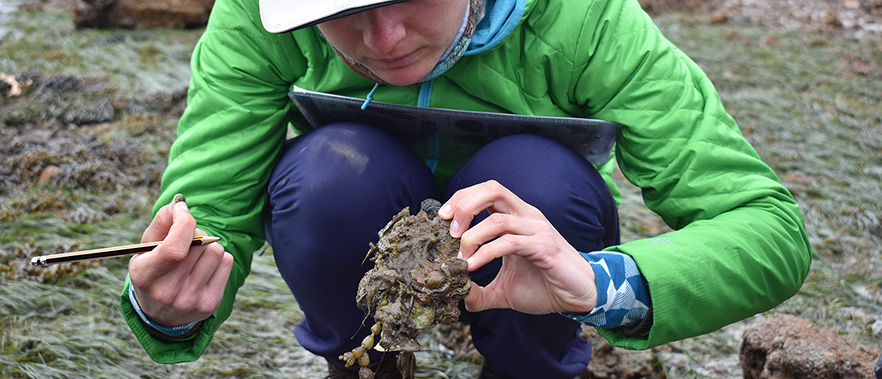
Our secondary programmes are hands-on and designed to captivate students and teach them scientific techniques. The programmes align with New Zealand curriculum standards. Some programmes can be combined to make full-day or multi-day field trips.
Please note that the rates quoted are for New Zealand schools only and do not include GST. We are happy to adapt any of these programmes for other interested groups.
Download brief details of all our secondary programmes (PDF)
Keep up to date with our latest programme opportunities and news
Online Meeting with a Marine Scientist
All our programmes can be supported either partly or fully by distance, allowing students to engage with our scientists.
Examples are:
- support for data analysis and interpretation of 3.1 achievement standards in Science
- live dissection and feedings for demonstrations of adaptations (relevant to form and function in biology)
- live induction in a Marine Metre Squared survey so students are equipped to carry one out themselves. $60 (GST excl.) per hour
Marine Plastics, from Micro to Macro
Levels 5-8
Investigate ocean currents and anthropogenic impacts through a survey of ocean litter, where data collected feeds directly into the NZ waste legislation.
Provides students with the training, equipment and technology to take part as 'Citizen Scientists' in the Litter Intelligence Project.
This programme can be done either in Portobello or taken to your schools' local coastline area.
Price dependent on location – contact us for a quote.
Can provide either formative or summative assessment for A.S. 91188, A.S 91411, A.S. 91602 and A.S. 90926.
Download full information about the Marine Plastics programme (PDF)
Mighty Molluscs or Crabs Galore
Levels 5–7 and accelerated students at intermediate
What set of adaptations identify a taxonomy and how do variations to these relate to a species' survival in particular niches?
Classify molluscs or crustaceans, investigate how they feed and survey the intertidal zone to compare the distribution of their species.
3 hours
$12 per student (GST excluded) and supports A.S. 90925 and A.S. 91155.
Download full information about the Mighty Molluscs programme (PDF)
Download full information about the Crabs Galore programme (PDF)
Intertidal Investigations
Levels 6–8
Investigate adaptations of marine species and community structure on the rocky shore using appropriate sampling techniques either as a practice (formative) or final (summative) assessment for NCEA.
Links well with Diversity in Form and Function for a full-day programme.
Links to citizen science via the Marine Metre Squared project.
3 hours
$12 per student (GST excluded) and can provide either formative or summative assessment for A.S. 91158.
Download full information about the Intertidal Investigations programme (PDF)
Download a flier about the NZ Seashore Transect Survey (PDF)
Diversity in Form and Function
Levels 6–8
A comparative study to look at structure and function in relation to survival in particular niches.
Adaptations observed and demonstrated with living examples. Laboratory series of comparative dissections.
Focus is flexible depending on teachers' requirements: respiration/gas exchange, feeding/nutrition, or reproduction/life histories.
Supports learning for NCEA.
Links well with Intertidal Investigation for a full-day programme.
3 hours
$12 per student (GST excluded). $2 per student (GST excluded) for dissection. Supports A.S. 91155.
Download full information about the Diversity in Form and Function programme (PDF)
Behaviour of Marine Life
Levels 6–8
Investigate the behaviour of marine animals in response to abiotic and biotic environmental factors.
Living examples of symbioses, predator/prey adaptations, reproductive strategies and biological clocks.
Laboratory series of mini investigations with live examples of taxes and kineses.
3 hours
$12 per student (GST excluded) and supports A.S. 91603.
Download full information about the Behaviour of Marine Life programme (PDF)
Evolution: Patterns and Processes
Levels 6–8
Exploring living examples of adaptive radiation, divergent and convergent evolution.
Using a range of tools to gather evidence for evolution-including fossils, biogeography, comparative anatomy, life histories and mRNA analysis.
Marine examples of genetic variation in a population, allopatric and sympatric speciation.
4 hours
$16 per student (GST excluded). $2 per student (GST excluded) for dissection Supports A.S. 91605.
Download full information about the Evolution: Patterns and Processes programme (PDF)
Small Animal Study
Levels 6–8
Carry out a practical investigation in a biological context.
Focus on one animal species and investigate aspects of its ecological niche and its behaviour in response to abiotic and biotic factors.
Design and carry out individual student investigations.
Under guidance, students do practical work and data collection.
Includes support with reference materials and bioethics.
3 days approximately
$76.00 per student (GST excluded) and provides the core work for achieving A.S. 91601.
Download full information about the Small Animal Study programme (PDF)
Ocean Acidification
Levels 6-8
Carry out a practical investigation in an Earth and Space Science context.
Focus on abiotic changes of a future ocean (pH and/or temperature) and investigate the potential physical, ecological, or behavioural impacts.
Design and carry out individual student investigations.
Under guidance, students do practical work and data collection to meet the needs of NCEA.
Includes support with reference materials and bioethics.
3 days approximately
$76.00 per student (GST excluded) and provides the core work for achieving A.S. 91410.
Download full information about the Ocean Acidification programme (PDF)
Secondary Science Extension and Enrichment Programmes
Customised science enrichments programmes, perfect for Accelerated or GATE classes from individual schools or groups.
Customised programme example:
Years 9 and 10 (1–3 days) – Ocean Technology: Introduction to key abiotic parameters of the marine world via senses and instruments.
Exploring boat-based and/or shore-based fieldwork and data gathering via underwater robotics. Programmes are developed with the teacher and can cater to both Mathematics and Statistics, Technology, and Science (Nature of Science, + Earth and Space Science).
1–3 days
$54.50 per student/hour (GST excluded)
See more information about our science extension and enrichment classes
Contact
For secondary education enquiries and bookings, contact:
Teresa Mallard
Email teresa.mallard@otago.ac.nz
Tel +64 3 479 5843